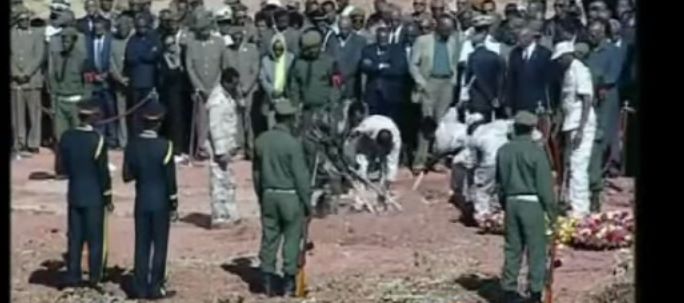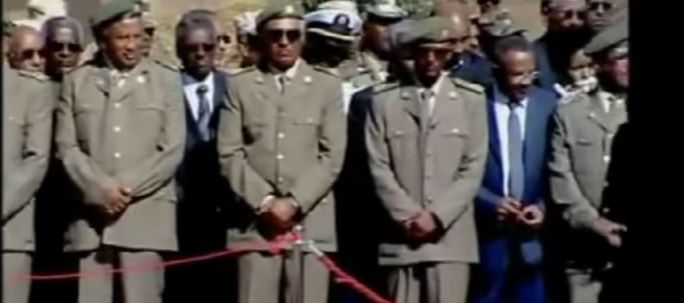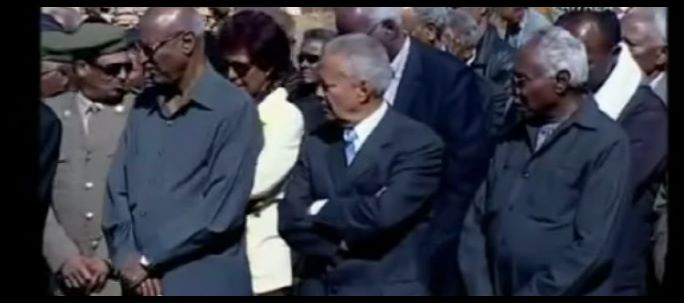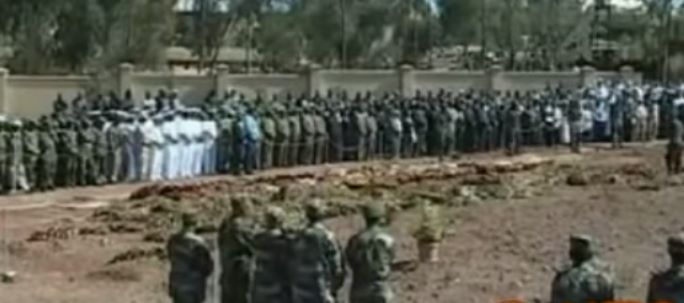Eritrea’s Generals Play a Waiting Game

Decked out in choice uniforms, Eritrea's senior ranking officers are regularly seen smiling and clapping hands obligingly during PFDJ's staged events. Wearing the same smart outfits, our not-so-Big Men are also expected to attend the funerals of their fallen comrades and feign sadness, as page after page of eulogy is read in somber tones.
With immediate family members wailing in the background, the valiant contributions of the deceased are read by another general, an associate or perhaps a close friend. The man was a hero and a legend, a brave fighter who took part in one decisive battle after another, and now we are gathered here to bid him farewell.
Our generals should know by now that Eritrea's supreme ruler is not about to dignify the funeral ceremony by tucking his shirt in, much less wear a suit and a necktie or formal traditional attire. It is an incongruent sight when juxtaposed alongside the other protocols.
Perhaps when their turn comes, which they must hope happens later than sooner, they should be content to get buried on the same cemetery with their former comrades. They have to be tortuously aware that they are a mere phone call away from being sent packing to an overseas hospital and never heard from again. Seared in their brain is the tragic fate of the late Naizghi Kiflu, a man more loyal to boss than country.
 Naizghi’s postmortem case had started all so promisingly when three men of PFDJ significance (Yemane Ghebreab, Tesfamicael Gerahtu and Osman Saleh) stopped by his London house to pay condolences. Naturally, the matter of transporting his body to Eritrea came up during the visit.
Naizghi’s postmortem case had started all so promisingly when three men of PFDJ significance (Yemane Ghebreab, Tesfamicael Gerahtu and Osman Saleh) stopped by his London house to pay condolences. Naturally, the matter of transporting his body to Eritrea came up during the visit.
Without checking with the one-man headquarters, the trio promised the family that a funeral back home was a given. In retrospect, they should have known better than to think that they were significant enough to make a decision of such magnitude. That is a red line that no one in his right mind would cross, a mistake that could cost one his job, his freedom or even his....
Much to the added grief of the bereaved, the burial arrangements were made without the express permission of the Funeral Director. It took only a phone call to set the record straight. Anyone who defies him even upon death can forget about a final resting place in the home country.
Though the folks back home have some idea that history might not offer much comfort to Naizghi Kiflu, their sense of decency would not allow them to deny anyone his own burial ground. Naizghi is Eritrea's son and that was just that. Say anything you want about the Eritrean people, having a cruel streak is not one of them.
More notorious for corruption than cruelty, even the generals couldn't believe that one could serve the El Capo so blindly, and for so long, and yet be deprived of a decent burial. Be forewarned that these are not the kind of sentiments to share with anyone, not even family, unless of course, courting disaster or accidental death.
It is the Reign of Crippling Fear in Eritrea, a paralysis that reduces a war hero into a shell of a man. Though adorned with glittering stars on both sides of his shoulders, he gets pushed around by the tyrant himself or, worse, by lower ranking officers with newly gained powers by association.
To be sure, there are some perquisites for craven loyalty to the throne. If the generals behave themselves all the way up to the last heartbeat, His Majesty might attend their funeral and--with ERi-TV glued on his movements--he will make sure to lay a giant wreath by the casket.
Still when all is said and done, the question in the mind of every PFDJ general should be, "Is it possible that I might be on the receiving end of the eulogy? Could the same man who decides whether or not I'm 'frozen,' transferred, demoted, jailed or exiled have something to do with my ultimate demise?”






![[AIM] Asmarino Independent Media](/images/logo/ailogo.png)